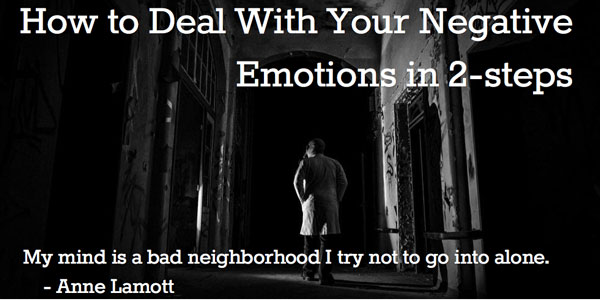Do you ever find yourself caught up in your emotions?
If you’re like me, you feel pretty good during the day but when it’s time for bed–or it’s the middle of the night–your mind becomes a whirlwind of negative thoughts.
Something that seemed perfectly acceptable in daylight suddenly leaves you overcome with anger, upset, worry, and embarrassment.
The Effects of Negative Emotions
Left unmanaged, these negative thoughts and feelings can destroy a good night’s sleep or consume an entire day.
Sure, you still go about your life, but these emotional spin-outs take you away from being fully present at your job or with your kids and family.
Worst of all, they keep you from being happy, fulfilled, energized, and effective in your life. An emotional vortex comes at a huge personal cost IF you let it get the better of you.
We know, from scientific research, that negative emotions can flood the brain with stress hormones that can take hours, or even the whole day, to subside.
We also know that people who are asked to suppress negative emotions actually have an increased stress response in their brain and cardiovascular system.
So, what’s the solution?
How to Manage Negative Thoughts
If counting to 10, saying “om”, or repressing your feelings hasn’t worked for you–you’re not alone.
It didn’t for me, either–but I found something that does!
There is one main emotional regulation technique I consistently use to manage my feelings and overcome the effects of negative thoughts. It’s from the book The Charisma Mythby Oliva Fox Cabane.
There is a simple thing you can do, based on science, to address your feelings at the core, so you can get back to living the life you WANT to live.
My #1 Tip to Calm Your Emotions
One of the best things you can do to immediately decrease your anger or upset about a situation is to change your belief about what happened.
This is called “cognitive reappraisal”. I’ve talked about it in this post. (If you want to find out about the science behind it check out Social Intelligence by Daniel Goldman.)
The reality is most of the time we don’t really know why a person behaves a certain way. Even if we think we know that person—because they’re in our family or we work with them—we don’t actually know why someone does what they do. Nor do we know for sure why certain circumstances are in our life.
So why not choose a belief about a situation that puts you in a more positive mental state and increases your ability to deal with it?
This is not about tricking yourself, rewriting reality, toxic positivity, or being in denial. Changing beliefs has been scientifically shown to be a more effective and healthy solution than trying to repress feelings.
Two Journal Prompts to Transform Negative Beliefs
When you’re flooded with emotions, sit down with a piece of paper and pen. Ask yourself:
- What if this situation that I’m finding challenging is actually a good thing? What if it works out perfectly for me?
- Repeat the question a few times and watch how creative your mind gets with the answers.
- Then write down all of the ways that this situation could work out perfectly for you in the end. Write down all the possible advantages you will have from this seemingly “unfortunate” experience.
- Write it down in the present tense. “This conversation is going well” or, even better, in the past tense, “It all worked out brilliantly!”
Make this description detailed, full of sensory experiences of how things will look, what people will say, and how you will feel. Think up a few different ways that it could all turn out great in the end.
Changing Your Beliefs Can Change Your Life
Why is this practice so effective? Writing something down affects our beliefs more deeply than other modes of expression. It helps things that we’ve imagined feel real.
The brain has a tendency to accept imagination as reality. Usually, we use our imagination to terrorize ourselves, but this technique flips it around. It teaches us how to use the power of our imagination to get back to our life again.
It’s kind of weird, but sometimes these things that you’ve imagined—some version of your perfect happy ending—actually come true.
I had an experience recently interacting with a person who I thought didn’t really care about me. It had been going on for months and I didn’t see an end in sight. One evening I used this exercise. And I imagined how it could all work out. The next day we talked and she said exactly what I had dreamed up in my writing exercise.
What?! Seriously, it worked.
I’d love to hear from you if you try this technique or if you’ve used it in the past. What happened out of it?
Or just leave me a comment to let me know that I’m not the only one who sometimes gets caught up in my emotions and spirals to dark places.
“My mind is a bad neighborhood I try not to go into alone.”
– Anne Lamott
Spiraling up,
Cecilia










Great post, Cecilia! I think I have the very situation to try it on, too.
Here’s to spiraling up!
Glad to hear it! Let us know how it goes!